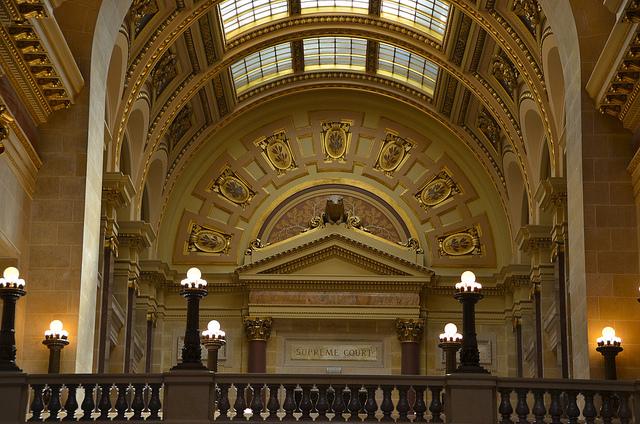Wisconsin was one of only eight states that spent more than $1 million in its 2014 Supreme Court race.
According to a report from Justice at Stake, the Brennan Center for Justice and the National Institute on Money in State Politics, spending for Wisconsin’s one-seat election in 2014 totaled $1.83 million.
Ryan Owens, political science professor at the University of Wisconsin, said the process of spending on Supreme Court campaigns depends on how the state selects justices.
While some states appoint their Supreme Court justices, Wisconsin uses public votes to elect theirs, Owens said. Campaign financing is inherent to election-based positions, he said.
According to Justice at Stake, 22 states use an election system, and 24 appoint their judges with bipartisan commissions.
Jay Heck, executive director of Common Cause Wisconsin, said the Supreme Court has the final say on many public policy issues in the state, which is why interest groups might decide to spend money trying to influence those races. He said supporting Supreme Court campaigns is less expensive than donating to legislative candidates.
Heck said it is typical for outside groups to far outspend the candidates themselves, who often don’t spend more than a few hundred thousand dollars.
Dennis Dresang, a professor emeritus in UW’s La Follette School of Public Affairs, said the U.S. Supreme Court’s “Citizen United” ruling in 2010 established that independent groups can spend unlimited amounts on campaigns, as long as they do not explicitly say to vote for or against a particular candidate.
Heck said that is why a large part of interest groups’ independent spending goes toward negative television ads intended to sway viewers to vote for a different candidate.
But some critics worry this is to the detriment of the position. The influence money has on the success of Supreme Court justices negatively affects the objectivity those justices have in making rulings, Heck said.
“It’s very detrimental,” Heck said. “Justices are supposed to be impartial. They’re not supposed to let their own personal or political views influence their reading of the law.”
Dresang also said justices might sway their decisions one way if they hear a case that pertains to an interest group that financially supported their campaign.
Dresang said in situations where judges feel inappropriate ruling in a case that deals with the interests of a group that donated to their campaign, judges are expected to recuse themselves from that particular case.
But in Wisconsin, unlike other states, Dresang said no one enforces recusals — judges decide for themselves.
In the court’s July ruling to dismiss the John Doe probes into Walker’s 2012 recall election, in which Walker’s campaign was accused of illegally collaborating with special interest groups, critics said some judges should have recused themselves from the case. The court ruled 4-2 that Walker did not break any laws.
Some critics say some presiding judges should have recused themselves because Wisconsin Club for Growth, a special interest group, had previously donated to both Walker’s campaign and four of the justices at the time, Heck said.
But despite critics’ concerns about how donations to Supreme Court campaigns affect justices’ objectivity, Owens said U.S. Supreme Court rate reviews of state courts show there is not much difference in quality of courts, regardless of whether they are made up of appointed or elected justices.
“People seem to think that if you make judges elected, they’re less independent,” Owens said. “But they’re nevertheless more accountable to the people, to the voters.”
Owens said more often than not, voters feel better about having a say in electing Supreme Court justices, rather than adhering to an appointment process.
Owens said states vary in the way they finance Supreme Court races, including public funding or reporting restrictions.
The next Supreme Court race election will be held in April. A seat held by Justice N. Patrick Crooks, who passed away in September, will be up for election. Currently, Justice Rebecca Bradley temporarily holds the seat after Gov. Scott Walker appointed her to the position after Crooks’ death. She will have to vie for the seat against Wisconsin appeals court judge JoAnne Kloppenburg and Milwaukee Circuit Court judge Joe Donald.
Owens said Walker’s Bradley appointment was probably to steer away other conservative competition for the seat, likely leaving her as the front-running right-wing candidate after the primary elections. He said Kloppenburg, who currently presides over the Wisconsin Supreme Court of Appeals, will likely emerge as the left-leaning candidate come primaries.


